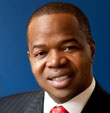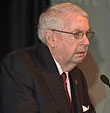
Education: John Jay College of Criminal Justice (BA), New York University (JD)

Age: 78
Education: St. John’s University (BA), St. John’s University School of Law (JD)
Charles Hynes has held the office of Brooklyn District Attorney for 23 years but believes there remains important work to be done. If re-elected, Hynes wants to expand a number of groundbreaking programs he established that are being replicated across the country. One of these is Project Redirect, an alternative sentencing program for gang members that requires community service and academic performance in lieu of a prison sentence. Forty of its 58 participants have graduated school and the government has saved tens of thousands per participant annually. Hynes also wants to expand Community and Law Enforcement Resources Together (ComALERT), which provides wraparound services for parolees including job training and placement, housing support, and assistance with mental illness, among other services. A Harvard professor’s study found the program reduced recidivism by half and the $2,200 cost per participant was far less than the incarceration average of $64,000. Hynes also wants to resurrect community courts, specifically in Brownsville, because it shows the community justice is being carried out while also providing crime prevention services. On good government issues, Hynes rebuts the criticism that his office did not bring cases against Senators Carl Kruger or John Sampson, noting that he has convicted more elected officials than any other district attorney in history including most notably, Brooklyn Democratic Party Chair Clarence Norman. He also supports the Governor’s Public Trust Act. Hynes believes criticism of his policy of not making immediately known defendants in sexual abuse cases in the ultra-Orthodox Jewish community is unwarranted. He notes that successful prosecutions of sexual abuse cases in the ultra-Orthodox community are historically low, and that the Kol Tzedek program created in collaboration with community groups resulted in the arrest of over 80 people before it generated media criticism over shielding the names of defendants. In response to reporting of wrongful convictions by his office, Hynes argues they represent a miniscule fraction of the tens of thousands of cases his office has prosecuted. Hynes, however, concedes a Brady violation in the case of Jabar Collins but disagrees with Eastern District Judge Dora Irizarry that Michael Vecchione, the head of the office’s rackets division, was responsible. He points to his open-file discovery policies and the release of 22 defendants for wrongful convictions in demonstrating how his office works well with defense attorneys. Citizens Union believes that while Hynes has established many innovative prisoner reentry and alternative sentencing programs during his career, earning our preference in 2005, there comes a time when change is needed for an office even when held by a long-serving public official with notable successes. That there are questions about too many cases and practices in his office only further informs CU’s decision to support Hynes’ opponent.
